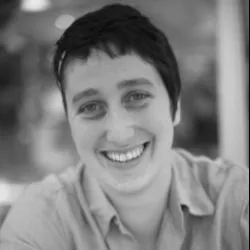
Danielle Peers: Inclinations
The film opens on an empty, institutional-feeling building. It could be almost any institutional building in these pandemic times. These, however, are the pre-COVID hallways and 100-foot ramp of the University of Alberta in summer, and the set for Inclinations, the film that Alice Sheppard and I are touring on the (now digital) film festival circuit. Choreographed, directed, and shot from disability perspectives, this 6-minute dance-on-film delves into the playful connections enabled where disability, community and ramp meet. It also delves into the discordant eugenic and racist inclinations that lurk just below the surface (watch it here).

There are many ways that Inclinations resonates with my experiences as a queer, non-binary, white, disabled settler during the COVID-19 crisis. When we made the film, we intended the eerie green institutional scenes to represent eugenic times and spaces (particularly in Alberta). If this pandemic has clarified anything, it is that eugenics is not in the past: ableist triaging of medical supports; coerced DNRs; herd immunity strategies; and the immense precarity of those we have institutionalised (e.g., long-term ‘care’, prisons, detention centers).
Like 19th and 20th century eugenics, systemic ableism in today’s pandemic eugenics is deeply interwoven with white supremacy, colonization, and xenophobia. Consider: racialized precarity to COVID exposure and death; blaming health inequities on the precarious; the refusal to track racial disparities in Canada; and anti-isolation Nazi rallies. Although America’s right wing is an obvious example, I invite you to consider how these ideologies persist in each of our countries, communities and consciences. Think about the overnight granting of system-wide accommodations (e.g., work from home, liveable income supplements) that have long been widely denied to disabled people, and that are still often refused to us. Consider how economic shutdowns are deemed a necessary hardship when settler’s lives are at stake, how disputed-pipeline-building has been deemed an essential service, putting Indigenous lives at risk, and how any negative economic impact is deemed an unreasonable cost when Indigenous lives, livelihoods, and lands are on the line. This pandemic has made clear that eugenics, white supremacy, and colonialism are alive and well-intertwined.
But there is another side to Inclinations, and to pandemic times: an intimate, joyful, daring, mischievous, irreverent, radically interdependent and prefiguratively crip side. There is a renewed recognition and celebration of queer, trans, femme, and BIPOC disability, sick, Mad, and neurodivergent care collectives, perspectives, and justice movements. “Disability is an art,” Neil Marcus writes, “it is an ingenious way to live.” Many of us have already learned how to do social isolation in style. We know how to add flourish(ing) to the sometimes-difficult task of socially un(der)supported (individual and collective) survival. We’ve long ago hacked digital dance parties, DIY masks, access intimacy, and consent-based care collectives. We’ve curated meaning in the months we are unable to leave home because of unshovelled snow, dishevelled supports, inaccessible places, and unwelcoming spaces. We’ve shed our idealizations of independence, nostalgia for the norm, and sentimentality around the status quo. We know the inevitability of transformation and the dangers of rehabilitation fantasies of “back to normal.”
In the wake of this pandemic, why would we try to rehabilitate pre-COVID Canada, when we could transform it into something more sustainable and just? Why are we clinging to Darwinian ideologies and economies of “survival of the fittest,” when we know that ecologies flourish on interdependent biodiversity and not individualist (self-declared) supremacy? While flattening this curve, why not heed our most creative, collective, and crip inclinations?


